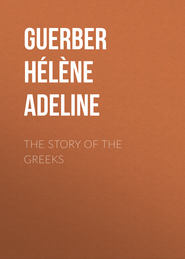По всем вопросам обращайтесь на: info@litportal.ru
(©) 2003-2024.
✖
The Book of the Epic: The World's Great Epics Told in Story
Настройки чтения
Размер шрифта
Высота строк
Поля
"Let Godfrey view once more, and smile to view
My second exile;—soon shall he again
See me in arms return'd, to vex anew
His haunted peace and never stable reign:
Yield I do not; eternal my disdain
Shall be as are my wrongs; though fires consume
My dust, immortal shall my hate remain;
And aye my naked ghost fresh wrath assume,
Through life a foe most fierce, but fiercer from the tomb!"
Canto X. The sultan, after journeying part way back to Egypt, pauses to rest, and is visited by a wizard, who spirits him over the battle-field and back to Jerusalem in a magic chariot. This pauses at a hidden cave, the entrance to an underground passage, by which they secretly enter the sultan's council chamber.
Ismeno shot the lock; and to the right
They climb'd a staircase, long untrod, to which
A feeble, glimm'ring, and malignant light
Stream'd from the ceiling through a window'd niche;
At length by corridors of loftier pitch
They sallied into day, and access had
To an illumined hall, large, round, and rich;
Where, sceptred, crown'd, and in dark purple clad,
Sad sat the pensive king amid his nobles sad.
Solyman, overhearing as he enters some of the nobles propose a disgraceful peace and the surrender of Jerusalem, hotly opposes such a measure, and thus infuses new courage into their breasts.
Canto XI. Meantime Godfrey of Bouillon, having buried his dead, questions the knights who were lured away by Armida, and they relate that, on arriving near the Dead Sea, they were entertained at a sumptuous banquet, where they were given a magic draught, which transformed them for a time into sportive fishes. Armida, having thus demonstrated her power over them, threatened to use it to keep them prisoners forever unless they would promise to abjure their faith. One alone yielded, but the rest, delivered as prisoners to an emissary from Egypt, were met and freed from their bonds by the brave Rinaldo, who, instead of accompanying them back to camp, rode off toward Antioch.
The Christians now prepare for their final assault, and, advised by Peter the Hermit, walk in solemn procession to the Mount of Olives, where, after singing hymns, all devoutly receive Communion. Thus prepared for anything that may betide, they set out on the morrow to scale the city walls, rolling ahead of them their mighty engines of war, by means of which they hope to seize the city.
Most of the Crusaders have laid aside their heavy armor and assumed the light gear of foot-soldiers the better to scale the walls, upon which Clorinda is posted, and whence she shoots arrow after arrow at the assailants. Wounded by one of the missiles flung from the wall, Godfrey seeks his tent, where, the physician failing to extract the barb, an angel brings a remedy from heaven which instantly cures the wound.
Canto XII. After awhile, seeing she does not do as much execution as she would like, Clorinda proposes to Argantes that they steal out of the city by night, and by chemical means set fire to the engines with which the Christians are threatening to capture the city. Willingly Argantes promises to accompany her in this perilous venture, but her slave, hoping to dissuade her, now reveals to her for the first time, the story of her birth, and informs her she is the daughter of a Christian. He adds her dying mother besought him to have her child baptized, a duty he had failed to perform, although repeatedly warned by visions to repair his neglect. But, although similar visions have frequently haunted the dreams of Clorinda herself, she persists in her undertaking to set fire to the war machines.
She has no sooner done so, however, than the Christians, aroused, set out in pursuit of her and of her companions. Bravely covering their retreat so they can re-enter the city safely, Clorinda delays her own until the gates closed. But with great presence of mind, the warrior-maid, who is wearing black armor, mingles in the darkness with the Crusaders. None of these suspects she does not belong to their ranks, save Tancred, who follows her to a remote place beneath the walls, where he challenges her to a deadly fight, little divining who she is. The battle proves fierce, and both combatants strike until Tancred runs his sword through his opponent. Dying, Clorinda reveals her name and faintly begs Tancred to baptize her before life leaves her body.
"Friend! thou hast won; I pardon thee, and O
Forgive thou me! I fear not for this clay,
But my dark soul—pray for it, and bestow
The sacred rite that laves all stains away:"
Like dying hymns heard far at close of day,
Sounding I know not what in the sooth'd ear
Of sweetest sadness, the faint words make way
To his fierce heart, and, touch'd with grief sincere,
Streams from his pitying eye th' involuntary tear.
Such a request cannot be disregarded, so, although Tancred is frantic with grief at the thought of having slain his beloved, he hurries to a neighboring stream, draws water in his helmet, and, after baptizing his dying sweetheart, swoons over her body. His companions, finding him there, convey him and Clorinda's body to his tent, where they vainly try to rouse him, but he is so overcome with melancholy that he thinks of nothing but joining Clorinda in her tomb.
Canto XIII. Meantime the foe, having heard of Clorinda's death, vow to avenge her, while the Crusaders seek materials to reconstruct their towers. Hastening to a forest near by, they discover a wizard has cast such a spell upon it that all who try to enter are frightened away. Finally Tancred enters this place, and, although he is met by earthquakes and other portents, he disregards them all, and starts to cut down a tree. But, when blood gushes from its stem, and when Clorinda's voice informs him he has wounded her again, he flees without having accomplished his purpose. Heat and drought now cause further desertions and discourage the Crusaders, until Godfrey, full of faith in the justice of their cause, prays so fervently that rain is vouchsafed them.
Canto XIV. In a dream Godfrey is now admonished to proceed, and told, if he can only persuade Rinaldo to return, Jerusalem will soon fall into the hands of the Christians. Because no one knows where Rinaldo has gone, Godfrey despatches two knights in quest of him. After some difficulty they interview a wizard, who, after exhibiting to them his magic palace, tells them Armida, to punish Rinaldo for rescuing his companions from her clutches, has captured him by magic means and borne him off to her wonderful garden in the Fortunate Isles. The hermit then bestows upon them a golden wand which will defeat all enchantments, and bids them hasten to the Fortunate Isles.
Canto XV. Hastening off to the sea-shore armed with this golden wand, these two knights find a magic vessel, wherein they sail with fabulous speed over the sea, and through the Strait of Gibraltar, out into the western ocean, the nymph at the helm meanwhile informing them that this is the road Columbus is destined to travel. Sailing thus they reach the Fortunate Isles, where, notwithstanding many enchantments and temptations brought to bear to check their advance, they, thanks to the golden wand, force their way into Armida's wonderful garden.
Canto XVI.
These windings pass'd, the garden-gates unfold,
And the fair Eden meets their glad survey,—
Still waters, moving crystals, sands of gold,
Herbs, thousand flowers, rare shrubs, and mosses gray;
Sunshiny hillocks, shady vales; woods gay,
And grottoes gloomy, in one view combined,
Presented were; and what increased their play
Of pleasure at the prospect, was, to find
Nowhere the happy Art that had the whole design'd.
So natural seem'd each ornament and site,
So well was neatness mingled with neglect,
As though boon Nature for her own delight
Her mocker mock'd, till fancy's self was check'd;
The air, if nothing else there, is th' effect
Of magic, to the sound of whose soft flute
The blooms are born with which the trees are deck'd;
By flowers eternal lives th' eternal fruit,
This running richly ripe, while those but greenly shoot.
Then, peeping cautiously through the trees, they behold Rinaldo reclining amid the flowers, his head resting in the enchantress' lap. Biding their time they watch Armida leave the enamoured knight, then step forward and bid him gaze into the magic mirror they have brought. On beholding in its surface a reflection of himself as he really is, Rinaldo, horrified, is brought to such a sense of his depraved idleness, that he springs to his feet and proposes to leave immediately with his companions. They are about to depart without bidding farewell to the fair enchantress, when she pursues them, and, after vainly pleading with Rinaldo to stay with her, proposes to join him in any quality. When he abruptly rejects her advances and sails away, Armida, disappointed and infuriated because she has been scorned, hastens off to the Egyptian camp.
Canto XVII. There she joins the Christians' enemies, declaring she dreams of naught save slaying Rinaldo, and takes an important part in the review which the poet describes minutely. To compass her ends the artful Armida, whose charms have so lavishly been displayed that they have fired every breast, promises to belong to the warrior who will bring her Rinaldo's head. Meanwhile this hero has returned to Palestine, and is met by the wizard, who, after reproving him for his dalliance, gives him wonderful armor, and exhibits on the shield the great deeds of ancestors of the Duke of Ferrara.
Canto XVIII. Newly armed, Rinaldo now returns to the crusaders' camp, apologizes to Godfrey for breaking the rules of the crusade, relates his adventures, and, after humbly confessing his sins, starts forth to brave the spells of the magic forest. Not only does he penetrate within its precincts, but, undeterred by all Armida's enchantments, cuts down a tree, although, in hopes of staying his hand, her voice accuses him of cruelly wounding her! No sooner has this tree fallen than the spell is broken; so other trees are cut down without difficulty, engines built, and all is prepared for a new assault on Jerusalem.
Godfrey is particularly eager to make this new attempt immediately, because a carrier-pigeon has been caught bearing a message from the Egyptians to the Sultan of Jerusalem, apprising him that within five days they will come to his aid. During this assault of Jerusalem, a sorcerer on the walls, working against the Christians, is slain by a rock.
Soon after, thanks to the efforts of the Crusaders, the banner with the Cross floats over the walls of Jerusalem!
Then raised the Christians all their long loud shout
Of Victory, joyful, resonant, and high;
Their words the towers and temples lengthen out;
To the glad sound the mountains make reply:
* * * * *
Then the whole host pours in, not o'er the walls
Alone, but through the gates, which soon unclose,
Batter'd or burnt; and in wide ruin falls
Each strong defence that might their march oppose.
Rages the sword; and Death, the slaught'rer, goes
'Twixt Wo and Horror with gigantic tread,
From street to street; the blood in torrents flows,
And settles in lagoons, on all sides fed,








